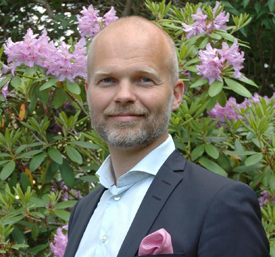It is self-evident that the Unitary Patent system is good for Europe. The project will attract the best judges, there is a good set of procedural rules, the industry wants it, this is a ‘no brainer’ and the start of the system is taking too long.
Alexander Ramsay, chairman of the Preparatory Committee of the UPC said this at the Unitary Patent Package Conference, 8 and 9 february 2018 in The Hague. Ramsay, who has been on the dossier for ten years, five of them in the PrepCom, hailed the companionship and the ‘extremely dedicated people’ he has been working with.
 According to Ramsay, the delays in the UP project, caused by the Brexit vote of 23 June 2016 and the German constitutional complaint which was filed last year against ratification of the Unified Patent Court Agreement (UPCA), are hard to accept. Still, the opinions of several associations (EPLIT, GRUR, DAV, BRAK, EPLAW) which had been requested by the German Federal Constitutional Court (FCC), have made him hopeful the Unitary Patent project will come through. All of these organizations have concluded the complaint should not be admitted by the FCC, or be rejected as unfounded.
According to Ramsay, the delays in the UP project, caused by the Brexit vote of 23 June 2016 and the German constitutional complaint which was filed last year against ratification of the Unified Patent Court Agreement (UPCA), are hard to accept. Still, the opinions of several associations (EPLIT, GRUR, DAV, BRAK, EPLAW) which had been requested by the German Federal Constitutional Court (FCC), have made him hopeful the Unitary Patent project will come through. All of these organizations have concluded the complaint should not be admitted by the FCC, or be rejected as unfounded.
Ramsay hopes the UK will complete the ratification formalities of the UPCA and the Protocol on Privileges and Immunities soon and that it can stay in the UP system post-Brexit. It is obvious, a ‘no brainer’ as well, according to the chairman of the PrepCom, that long-term participation of the UK is in the interest and to the benefit of all. ‘As a series of scholars have explained, this is legally possible. It depends on the political will.’
It is not easy to prepare for the system and be ‘almost ready for an indefinite period of time’, according to Ramsay. By now 15 Member States have ratified the UPCA, which means that quite a high number of states will be part of the UP system once it comes into effect. The Czech Republic, Slovakia, Cyprus and Ireland are not expected to be in this first group.
Regarding the Protocol on Provisional Application (PPA) of the UPCA, support from Germany and two more states is necessary. The protocol will allow parts of the UPC Agreement to be applied early. This includes final decisions on the practical set up of the Court, the recruitment of judges and testing of IT systems. The provisional application phase will also be used to allow for early registration of opt-out demands.
Despite the uncertainty and delays, technical preparations are going on, Ramsay explained during the conference. The Preparatory Committee formed five ‘interim teams’, which have to make sure everything works once the period of provisional application starts.
For the HR team, the recruitment of judges is a huge challenge. As Ramsay explained: ‘We cannot do the final recruitment, interviews, appoint judges before the start of the PPA.’ But plans have already been made how to organize this process. There will probably be interviews with candidate judges in four different locations. Teams of interviewers will be formed, who will need to stay in hotels. ‘This is a big operation that needs to run smoothly.’ Also during the PPA, the judges and other staff of the court will have to be trained.
The interim Registry, FI and Corporate functions teams are busy, among others, with finding resources so the court can do what it has to do – ‘The delay costs money’ – creating an HR system, an accountancy system etc. ‘We’re trying to use the time that we have to make sure the system works when we’re starting’, Ramsay said.
The interim IT team, chaired by Kevin Mooney, is working on the CMS system. According to Mooney, it turned out to be very complicated to translate the rules of procedure into a working CMS, although the work is progressing steadily. He explained the CMS will take parties through the steps of the proceedings. Generally, they will have to do most work offline and then upload documents.
Mooney also said some minor changes of the Rules of Procedures can be expected, for instance concerning the procedure to opt patents out of the jurisdiction of the UPC. Under the current rules, any mistake in the opt-out means it will have no effect until it is corrected. It’s under discussion however whether an exception should be made for minor mistakes, for instance in a name. Another issue still under debate is what should happen if the wrong patent number is used when registering an opt-out.
Although Kevin Mooney admitted he has had to change his predictions about the start of the UPC many times, he still pictured what may happen in the upcoming year, at least if the German constitutional complaint is not admitted or otherwise rejected. The UK may be in a position to ratify in March, with the PPA and the process of recruitment, appointment and training of judges and other court staff starting in April or May.
The sunrise period, during which patents can be opted out of the UPC, could start in October, and finally, by January 2019, the UPC could open its doors for cases, Mooney hopes.